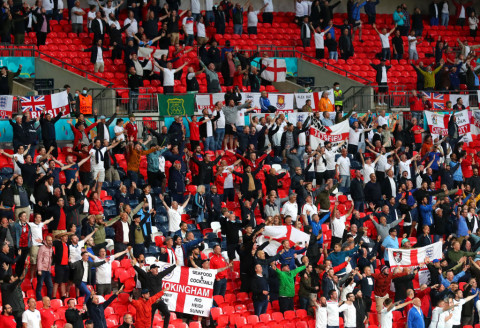Experts at Manchester Met’s Institute of Place Management discuss the factors that create a matchday atmosphere
By Dr Chloe Steadman, Lecturer in Marketing, and Dr Steve Millington, Director of the Institute of Place Management at Manchester Metropolitan University.
The scenes unfolding at Wembley stadium on Wednesday night during the Euro 2020 semi-final demonstrates what fans bring to football games – an emotional landscape that can never be adequately replicated by interventions such as those put into place during the COVID-19 pandemic to emotionally charge empty stadiums.
These interventions included synthetic matchday crowd noises and digital mosaics of supporters.
The internet meme of a Switzerland fan at Euro 2020 is another example of a moment that perfectly encapsulates the emotional rollercoaster of being a football fan. Football stadiums can capture atmospheric moments like this, and they can’t be fully replicated by fans gathered around the television at home.
While the Euro 2020 tournament has emphasised what footfall fans can bring to the matchday experience, before the COVID-19 pandemic there were growing concerns about the flattening atmosphere during English Premier League matches.
This included some dissatisfaction with the perceived lack of atmosphere at grounds such as Chelsea’s Stamford Bridge, Manchester United’s Old Trafford, Liverpool’s Anfield and Manchester City’s Etihad Stadium.
The latter was the focus of our research into matchday atmospheres and the perception that Manchester City’s contemporary Etihad Stadium, despite enjoying a period of unprecedented successes on the pitch, was said to have a different atmosphere than at the club’s ‘spiritual home’, Maine Road, which the club left in 2003.
The purpose of our study, therefore, was to identify and analyse fan experiences and understand why there was a growing negative perception of the quality of atmosphere during matchdays.
There were many contributing factors into our study as to why fans might perceive a negative atmosphere experience and many top-flight clubs are hearing similar things, which raises a series of questions about the future of football – and its atmospheres – for both clubs and the governing bodies. But there has been no such problem for England during this tournament as fans returned to Wembley stadium in numbers not seen since before the pandemic.
With England in their first major men’s tournament final since the 1966 World Cup, and a new season about to start with fans back in stadiums, there has been an eruption of support across the country, and a gathering expectation of success.
As 1966 demonstrated, the feel-good factor is likely to shape both spectator and wider societal expectations. The English, it seems, are once again falling back in love with football.
Other than the scenes at the stadiums themselves, football fans across Europe have been seeking out collective experiences, where they can watch the game with others.
Gatherings at home, beer gardens and large outdoor screening areas, which have popped up in many cities, are all contexts through which fans not only demonstrate their individual passion, but importantly can come together with others to generate a matchday atmosphere.
Certainly, when England face Italy on Sunday, this could provide one of those rare collective moments which brings a nation together.
For fans lucky enough to be at Wembley for the final, and others gathering across the country to watch the game, an atmospheric bubble will begin to encompass England; a day of anticipation, nervousness, and anxiety, in anticipation of the ups and downs of the match itself, and the potential of a tense penalty shoot-out. The atmosphere of the game then will begin to stretch out and envelop everyone watching.
Although English clubs might benefit from England’s success at reaching the final, we are beginning to see how the nature of supporting a football team is changing.
The restrictions imposed by the pandemic have forced supporters to seek out new ways of watching the game. With the past frustrations and disenchantment our research reveals, if supporters can find the same kind of atmosphere at home or in the pub, then many might not even consider returning to stadiums next season, preferring these homelier environments instead.
A potential England win will not simply wash away the wider structural problems facing football. But for the moment the final – and the atmosphere – is something to be savoured.







